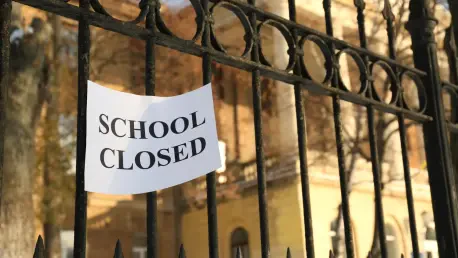In Clio, South Carolina, community members are uniting in a bold display of solidarity to challenge the planned closure of Clio Elementary School, which faces the chopping block due to budgetary constraints in Marlboro County. The decision to close the school is part of a wider financial restructuring effort aimed at consolidating resources; however, the local population perceives it as an unnecessary disruption. Over 50 demonstrators took part in a march through the town, not only vocalizing their strong opposition to the closure but also highlighting a palpable sense of community pride and protection for student welfare. This public outcry underscores the deep-rooted cultural significance of local schools, serving as more than mere educational facilities but as anchoring institutions in the community fabric. With Clio Elementary’s potential closure on the horizon, attendees of the march voiced a collective determination to protect local schools from being sacrificed under fiscal pressures.
Community Leaders Speak Out
Key figures within the community, such as Clio Mayor Adam Pate and community leader Eva McRae, have been at the forefront of the movement advocating for the preservation of Clio Elementary School. Their messaging strongly emphasizes both the historical and emotional importance of keeping the school operational for the benefit of future generations, urging stakeholders to consider the broader implications of such closures. Mayor Pate argued that closing local schools undermines the community’s cohesion, while McRae highlighted the adverse effects of transition on students and families, which could create unnecessary disruption in an already challenging educational climate. Both leaders stress that the projected financial savings from shutting down Clio Elementary do not seem to justify the potential negative impact on students’ educational stability. Their speeches have rallied community members to voice their objections, culminating in a symbolic march that brought their concerns directly to the streets.
The closure plan not only stirs emotional responses but also raises questions of practicality and timing. Critical voices stress that the consolidation strategy would redirect students from Clio Elementary and Bennettsville Intermediate to other local schools, potentially overwhelming existing resources. This scenario presents a logistical challenge and could disrupt students’ learning and emotional well-being by requiring them to adjust to new environments without adequate transition support. With such implications in mind, Mayor Pate and McRae’s advocacy extends beyond mere opposition, calling for more transparent communication and comprehensive impact assessments from decision-makers. Their determined stance has inspired community members to remain vigilant and actively participate in upcoming discussions, including a crucial Monday meeting with the school board where those impacted are expected to voice their concerns in person.
Financial Challenges and State Intervention
Amidst local opposition to the closure, the Marlboro County School District (MCSD) faces intense financial scrutiny due to faltering fiscal management and unmet budget deadlines. Compounding its struggles, the district is now subject to intervention by the South Carolina Department of Education (SCDE), which has signaled intent to assume control of its financial operations for stabilization purposes. This move illustrates the seriousness of MCSD’s fiscal recovery needs, driven by declining enrollment figures and staffing inefficiencies that have produced budgetary stress. It represents a bid from the state to help align district operations more closely with available resources, strengthening MCSD’s financial footing and restoring trust in its fiscal governance among community stakeholders.
Despite efforts to stabilize the situation through state intervention, local resistance persists, fueled by concerns that the planned school closures will yield minimal savings while disproportionately affecting students and families. The community’s fears point to potential chaos preceding a new school year, as the proposed plans do not adequately address student readiness or provide clarity on how displaced students will fit into the revised educational infrastructure. The broader discontentment reflects a unanimous sentiment that educational institutions should not be monetarily devalued and that fiscal challenges require more innovative and community-conscious solutions. As the school board meeting approaches, attention remains fixed on the unfolding events in Clio, with stakeholders urging consideration of alternatives that would maintain educational accessibility and preserve the integrity of local schooling environments.
A Community Determined to Preserve Education
Mayor Adam Pate and Eva McRae are leading the charge to preserve Clio Elementary School, emphasizing its historical and emotional significance for future generations. They believe closing schools fractures community unity, with McRae underscoring the stress and disruption for students and families transitioning to a new educational environment. Both argue that the financial benefits of shutting down the school don’t outweigh the potential harm to students’ educational stability. Their advocacy has galvanized the community, leading to a symbolic march that underscored their objections.
The closure plan fuels emotional responses and sparks practical concerns about timing and logistics. Critics point out that students, including those from Bennettsville Intermediate, would be shifted to other schools, potentially straining existing resources. This poses a challenge for ensuring students adapt smoothly. Pate and McRae push for transparent dialogue and thorough impact assessments, encouraging community vigilance and participation, especially during the crucial Monday school board meeting where affected voices will be heard directly.









